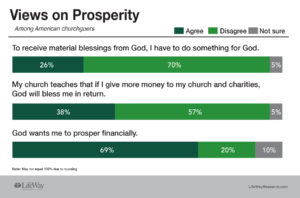President Trump’s high-profile embrace of prosperity gospel proponents like televangelist Paula White is shining new light on the theology of plenty that’s taken root in Pentecostal, evangelical and other Christian traditions.
In the past few weeks, publications ranging from Patheos to the Christian Post and The Guardian have posted stories about the movement and its beliefs.
The theology holds that God will bestow financial and other material blessings on those with sufficient faith and who give to churches, ministries and evangelists.
Some of the coverage was inspired by a recent LifeWay Research survey reporting that nearly one-third of Protestants say their churches teach that God blesses those who give money to the church, and 69 percent believe God wants them to prosper financially. (See graphic below).
The survey found that most Protestants in the U.S. buy into some form of this teaching.
“A significant group of churches seem to teach that donations trigger a financial response from God,” the organization’s executive director, Scott McConnell, said in an article summarizing the findings.
The prosperity movement has enjoyed a higher profile since Trump became president in 2016. The leader of his Evangelical advisory board is reported to be White, one of the biggest and wealthiest champions of the prosperity gospel in the United States.
“Unlike more traditional Christians, who believe that material success cannot be guaranteed in this life, White joins other megachurch preachers like Creflo Dollar in preaching that prosperity will come to the faithful—so long as they behave,” according to a 2017 analysis by the Harvard Political Review.
Besides hoped-for financial windfalls, many believers also are seeking reassurance and comfort in exchange for their gifts and good deeds, Duke University scholar Kate Bowler wrote earlier this year for Vox.
Bowler, an assistant professor of the history of Christianity in North America, wrote that she has encountered many who aren’t necessarily after money in their embrace of the prosperity gospel.
“Some people wanted Bentleys, but more wanted relief from the wounds of their past and the pain of their present,” she said in the article. “People wanted salvation from bleak medical diagnoses; they wanted to see God rescue their broken teenagers or their misfiring marriages. They wanted talismans to ward off the things that go bump in the night. They wanted an iota of power over the things that ripped their lives apart at the seams.”
And by no means is it a rare attitude.
“That belief is both controversial and fairly commonplace,” LifeWay Research said in its survey summary.
Researchers found that 38 percent of Protestants who attend church agree with the following statement: “My church teaches that if I give more money to my church and charities, God will bless me in return.”
Members of Pentecostal and Assemblies of God congregations were the most likely to agree with that statement, at 53 percent.
Among those identified as evangelicals, 41 percent concurred.
Just over half of African-American Protestants and 43 percent of Hispanic churchgoers ascribe to the belief, LifeWay Research reported.
Church attendance also influences those values, according to the survey.
“The more people go to church, the more likely they are to think God wants them to do well,” LifeWay Research reported. “Among those who attend at least once a week, 71 percent say God wants them to prosper financially. That drops to 56 percent for those who go to church once or twice a month.”



